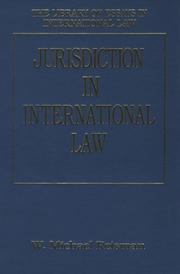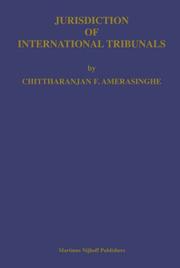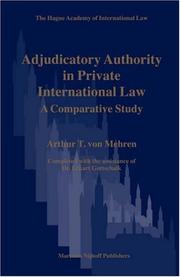| Listing 1 - 10 of 98 | << page >> |
Sort by
|

ISBN: 1840140933 9781840140934 Year: 1999 Publisher: Aldershot : Ashgate,
Abstract | Keywords | Export | Availability | Bookmark
 Loading...
Loading...Choose an application
- Reference Manager
- EndNote
- RefWorks (Direct export to RefWorks)

ISBN: 9041118381 9786610468133 1417555203 1280468130 9047403142 9781417555208 9789041118387 9781280468131 6610468133 9789047403142 Year: 2003 Publisher: London : Kluwer Law International,
Abstract | Keywords | Export | Availability | Bookmark
 Loading...
Loading...Choose an application
- Reference Manager
- EndNote
- RefWorks (Direct export to RefWorks)
This work analyzes the jurisdictional powers of international tribunals in certain areas of fundamental significance and importance. It clarifies how tribunals and consensual arrangements have approached problems and which general principles may have emerged.
Competence competence --- International courts --- Jurisdiction (International law) --- Domestic jurisdiction --- International jurisdiction --- Jurisdiction, Domestic --- Jurisdiction, International --- Arbitration (International law) --- International tribunals --- Tribunals, International --- Courts --- International courts.
Book
ISBN: 9780198786146 019878614X 9780191827846 Year: 2019 Publisher: New York, NY : Oxford University Press,
Abstract | Keywords | Export | Availability | Bookmark
 Loading...
Loading...Choose an application
- Reference Manager
- EndNote
- RefWorks (Direct export to RefWorks)
The Oxford Handbook of Jurisdiction in International Law provides an authoritative and comprehensive analysis of the concept of jurisdiction in international law. Jurisdiction plays a fundamental role in international law, limiting the exercise of legal authority over international legal subjects. But despite its importance, the concept has remained, until now, underdeveloped. Discussions of jurisdiction in international law regularly refer to classic heads of jurisdiction based on territoriality or nationality, or use the SS Lotus decision of the Permanent Court of International Justice as a starting point. However, traditional understandings of jurisdiction are facing new challenges. Globalization has increased the need for jurisdiction to be applied extraterritorially, non-State forms of law provide new theoretical challenges and intersections between different forms of jurisdiction have become more intricate.0This Handbook provides a necessary re-examination of the concept of jurisdiction in international law through a thematic analysis of its history, its contemporary application, and how it needs to adapt to encompass future developments in international law. It examines some of the most contentious elements of jurisdiction by considering how the concept is being applied in specific substantive and institutional settings.
Juridiction (droit international) --- Jurisdiction (International law) --- Domestic jurisdiction --- International jurisdiction --- Jurisdiction, Domestic --- Jurisdiction, International --- Arbitration (International law) --- International courts --- E-books --- Juridiction (Droit international)
Book
ISBN: 0191749087 0191640220 Year: 2014 Publisher: Oxford : Oxford University Press,
Abstract | Keywords | Export | Availability | Bookmark
 Loading...
Loading...Choose an application
- Reference Manager
- EndNote
- RefWorks (Direct export to RefWorks)
During the last 20 years the world has experienced a sharp rise in the number of international courts and tribunals, and a correlative expansion of their jurisdictions. This book draws on social sciences to provide a clear, goal-orientated assessment of their effectiveness, and a critical evaluation of the quality of their performance.
International courts. --- Jurisdiction (International law) --- Domestic jurisdiction --- International jurisdiction --- Jurisdiction, Domestic --- Jurisdiction, International --- Arbitration (International law) --- International courts --- International tribunals --- Tribunals, International --- Courts
Book
ISBN: 1108809189 1108771793 1108488765 1108808468 Year: 2020 Publisher: Cambridge : Cambridge University Press,
Abstract | Keywords | Export | Availability | Bookmark
 Loading...
Loading...Choose an application
- Reference Manager
- EndNote
- RefWorks (Direct export to RefWorks)
This book is motivated by a question: when should international courts intervene in domestic affairs? To answer this question thoroughly, the book is broken down into a series of separate inquiries: when is intervention legitimate? When can international courts identify good legal solutions? When will intervention initiate useful processes? When will it lead to good outcomes? These inquiries are answered based on reviewing judgments of international courts, strategic analysis, and empirical findings. The book outlines under which conditions intervention by international courts is recommended and evaluates the implications that international courts have on society.
International courts. --- International tribunals --- Tribunals, International --- Courts --- Jurisdiction (International law) --- Domestic jurisdiction --- International jurisdiction --- Jurisdiction, Domestic --- Jurisdiction, International --- Arbitration (International law) --- International courts
Book
ISBN: 0191886351 019259270X 0192592718 Year: 2020 Publisher: Oxford, England ; New York, New York : Oxford University Press,
Abstract | Keywords | Export | Availability | Bookmark
 Loading...
Loading...Choose an application
- Reference Manager
- EndNote
- RefWorks (Direct export to RefWorks)
Discussing under what conditions states can take unilateral action to promote the interests of the international community, this title puts forward an argument in favour of unilateral action in the common interest, but suggests a number of restraining techniques to limit its intrusiveness.
Intervention (International law) --- Jurisdiction (International law) --- Domestic jurisdiction --- International jurisdiction --- Jurisdiction, Domestic --- Jurisdiction, International --- Arbitration (International law) --- International courts --- Military intervention --- Diplomacy --- International law --- Neutrality

ISBN: 1281921793 9786611921798 9047422910 9789047422914 9789004158818 9004158812 9781281921796 6611921796 Year: 2007 Publisher: Leiden Boston Martinus Nijhoff Publishers
Abstract | Keywords | Export | Availability | Bookmark
 Loading...
Loading...Choose an application
- Reference Manager
- EndNote
- RefWorks (Direct export to RefWorks)
Conflict of laws --- Jurisdiction (International law) --- Forum shopping. --- Forum shopping --- Jurisdiction --- Domestic jurisdiction --- International jurisdiction --- Jurisdiction, Domestic --- Jurisdiction, International --- Arbitration (International law) --- International courts --- Jurisdiction. --- Law and legislation
Book
ISBN: 1316490386 1316490602 1316491927 1316490823 1139839527 1316491048 1107038790 9781107038790 1316488926 9781139839525 Year: 2016 Publisher: Cambridge : Cambridge University Press,
Abstract | Keywords | Export | Availability | Bookmark
 Loading...
Loading...Choose an application
- Reference Manager
- EndNote
- RefWorks (Direct export to RefWorks)
This examination of the jurisdiction of international courts and the admissibility of cases before them analyses jurisdictional and admissibility rules in light of the roles assumed by international courts in international life and in light of the roles that jurisdictional and admissibility rules play in promoting the effectiveness and legitimacy of international courts. The theory pursued views jurisdiction as a form of delegation of power (the power to exercise judicial power and decide the law) and regards admissibility as a framework for deciding upon the propriety of exercising such power. On the basis of this theoretical framework, the author critically evaluates the exercise of judicial discretion in the existing case law of a variety of international courts, distinguishing between the category-based case selection implicit in jurisdictional rules and the case-by-case analysis and selection implicit in rules on admissibility.
International courts. --- Jurisdiction (International law) --- Admissable evidence. --- International tribunals --- Tribunals, International --- Courts --- Domestic jurisdiction --- International jurisdiction --- Jurisdiction, Domestic --- Jurisdiction, International --- Arbitration (International law) --- International courts --- Admissable evidence
Book
ISBN: 1108565964 1108638775 110860112X 1108474942 Year: 2019 Publisher: Cambridge : Cambridge University Press,
Abstract | Keywords | Export | Availability | Bookmark
 Loading...
Loading...Choose an application
- Reference Manager
- EndNote
- RefWorks (Direct export to RefWorks)
The history of international adjudication is all too often presented as a triumphalist narrative of normative and institutional progress that casts aside its uncomfortable memories, its darker legacies and its historical failures. In this narrative, the bulk of 'trials' and 'errors' is left in the dark, confined to oblivion or left for erudition to recall as a curiosity. Written by an interdisciplinary group of lawyers, historians and social scientists, this volume relies on the rich and largely unexplored archive of institutional and legal experimentation since the late nineteenth century to shed new light on the history of international adjudication. It combines contextual accounts of failed, or aborted, as well as of 'successful' experiments to clarify our understanding of the past and present of international adjudication.
Book
ISBN: 0191844454 0192529951 019252996X Year: 2021 Publisher: Oxford, England : Oxford University Press,
Abstract | Keywords | Export | Availability | Bookmark
 Loading...
Loading...Choose an application
- Reference Manager
- EndNote
- RefWorks (Direct export to RefWorks)
Jurisdiction is a fundamental concept in law, as it provides the link between a government, its territory, and its people. Data travels through the internet without concern for any borders. This book argues how and why the concept of jurisdiction needs to be adapted across public and private areas - from criminal to commercial law.
Jurisdiction (International law) --- Internet --- Law and legislation. --- Cyberspace --- Domestic jurisdiction --- International jurisdiction --- Jurisdiction, Domestic --- Jurisdiction, International --- Arbitration (International law) --- International courts --- Law and legislation
| Listing 1 - 10 of 98 | << page >> |
Sort by
|

 Search
Search Feedback
Feedback About UniCat
About UniCat  Help
Help News
News